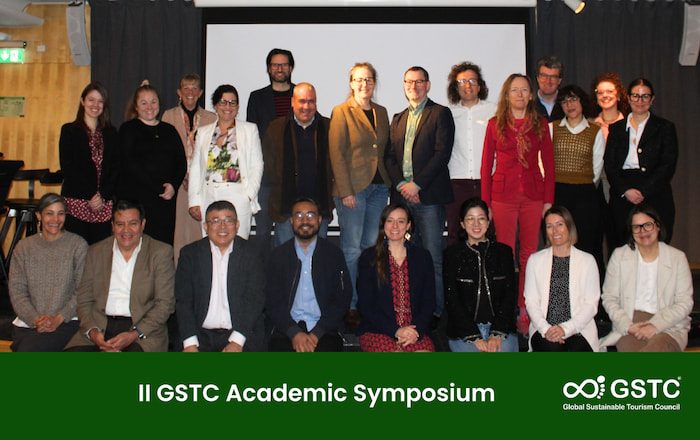
The second GSTC Academic Symposium was held on Tuesday, April 23rd, in Stockholm as part of the GSTC2024 Global Conference. This one-day, in-person event marked its second edition (the previous one was held in Sevilla in 2022) and provided a crucial platform for researchers, academics, and industry to converge and engage in rigorous discussions on the pressing issues facing sustainable tourism today.
Dr. Kelly S. Bricker, GSTC Vice-Chair and Professor of Sustainable Tourism, Ecotourism, and Nature-Based Recreation at Arizona State University, delivered the opening speech at the event.
“As the GSTC Research and Education Working Group, led by Dr. Jonathan Day, contemplating this global conference experience, we were interested in cultivating an atmosphere of critical reflection on stewardship, what is working, and where challenges continue. Our aim was to share research focused on topics ranging in scale from destination stewardship to evaluation tools applicable for industry. We also discussed ways to critically evaluate strategies and programs to advance the power and ingenuity of tourism to support the environmental, cultural, social and economic benefits of tourism while minimizing negative impacts. It has been a wonderful opportunity to connect with industry leaders as well as those who study sustainability in tourism, jointly working to find solutions to the challenges communities and our planet face,” said Dr. Bricker.
The GSTC Academic Symposium was specifically designed to foster a dynamic academic environment where thought leaders and scholars in sustainable tourism could share their insights and work. It facilitated a lively and engaging forum that encouraged the dissemination of innovative solutions and strategies to enhance sustainability within the tourism industry.

The Symposium serves as a vital link between the academic community and industry leaders, fostering a collaborative space where research and academic insights intersect with practical applications. By merging academic knowledge with industry expertise, the GSTC Academic Symposiums aim to drive significant progress in sustainability practices.
Find below the papers exposed during the Symposium:
Session 1
- Pressure from tourism hardest for religious World Heritage Sites and those in forest and coastal areas by Martin Falk, University of South-Eastern Norway
- Türkiye’s Sustainable Tourism Transformation: An Overview, by Mustafa Sogut, Global Sustainable Tourism Council
- An Integrative Literature Review of COVID-19-Driven Sustainability-Based Strategies for Tourism: 2020-2023 by Maryanne Eva, Ponts Business School
- Food tourism and storytelling in the Scandinavian North by Kajsa Åberg, Region Vasterbotten
- Ambosli National Park (Kenya) – Recommendations for Park Management and Regenerative Tourism by Masahiko Takai, Small Impact LLC
- GSTC Criteria As Self-Diagnosis Tool In The Mexican Caribbean by Pedro Moncada,Universidad del Caribe
- Impact of GSTC Destination Assessment on socio-economic and environmental changes in destinations: the case of Sukhothai Historical Park and City of Dubrovnik by So Young Lee, Tiffany Chan and Mihee Kang, Global Sustainable Tourism Council
- Juggling expectations and certification standards: Journey of a Norwegian destination towards acquiring the sustainable destination label by Per Strömberg and Ajay Kumar, University of South-Eastern Norway
- Estimating Effects of Tourism using Multiple Data Sources: The Miranda Tool as Part of a Spatial Decision Support System for sustainable destination development by Tobias Heldt, Dalarna University, Centre for Tourism and Leisure Research
Session 2
- Threats from climate change are increasing for Natural World Heritage Sites, by Eva Hagsten, Södertörn University
- Assessing Sustainable Tourism: Insights from Four Regions in Quebec by Yasmine Benbelaid, Université du Québec à Chicoutimi
- Design Students’ Perspectives on Safety Concerns when Designing Future Tourism Services by Minna Virkkula, Laura Hokkanen and Jonna Häkkilä, Oulu University of Applied Sciences
- New challenges call for new skills: providing quality education for sustainable destination managers with the WeNaTour project by Martina Catte, Alessia Fiorentino, Federica Bosco and Ilaria Doimo ETIFOR. Nicola Orio, Università degli Studi di Padova. Thomas Zametter, Carinthia University of Applied Science. Arthur Posch, Fachhochschulstudiengange Krems IMC. Shane O’Sullivan, Technological University of the Shannon. Dominik Muehlberger, Austrian Federal Office and Research Centre for Forests.
- Evaluating the social impact of culinary experiences, a question of scales and methods by Laura Arciniegas, Universitat de Barcelona
- Raising sustainability standards in leisure industry by Gorete Araújo, Alexandra Lavaredas and Francisco Dias, CiTUR, Polytechnic University of Leiria.
- Sustainable hospitality workforce – a study of decency and dignity in hotel Housekeeping by Maria Thulemark and Tara Duncan, Dalarna University. Susanna Heldt Cassel, Örebro University.
- Green road project from an environmental justice perspective: stakeholders, alternatives and conflicts by Öykü Öztürk Karali, GSTC
The event not only allowed for the presentation of new research but also sparked intellectual discussions among participants and attendees who left the symposium enriched and inspired, with insights and ideas to implement new strategies in their respective fields and communities.




